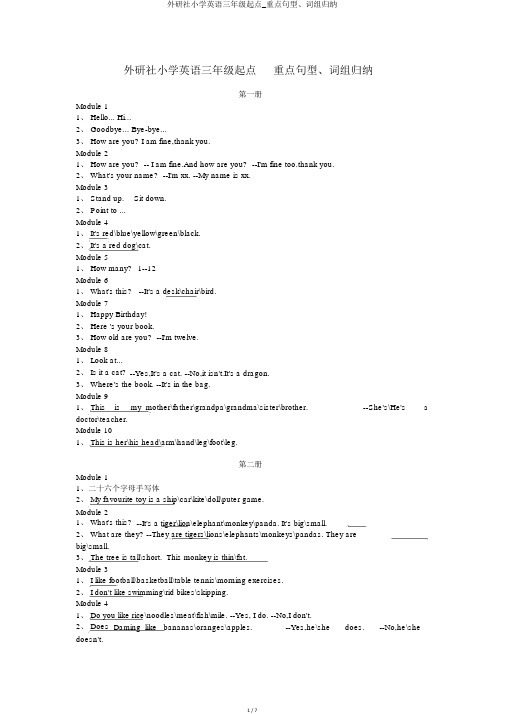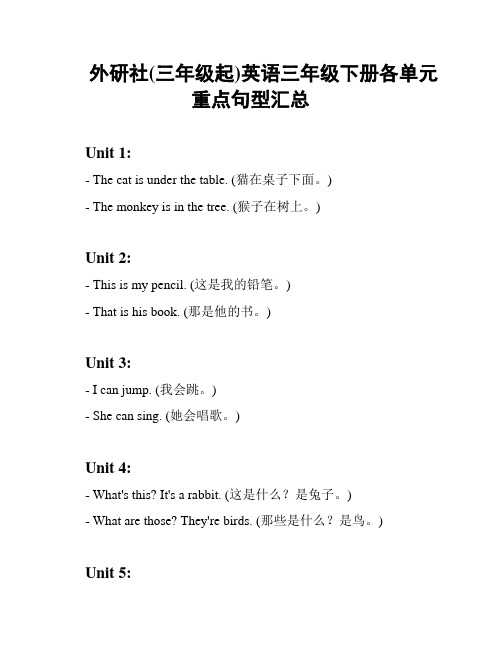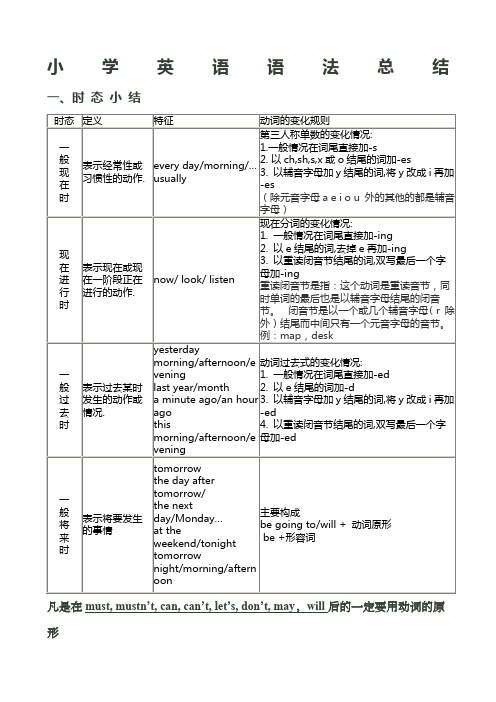最新外研社小学三年级上下册英语语法
(外研新版教材)三年级英语下册知识点总结

He works hard.
She tries hard at Science.
She runs fast at PE.
2021/10/10
10
3.I want to visit London.
Xiaoyong wants to fly.
Xiaoyong wants to be an astronaut!
How many girls are there? There is a girl in my class.
There isn’t a phone there. 16.What’s sixty plus thirty?
It’s ninety.
2021/10/10
15
17.What day is after Thursday? It’s Friday.
I will see lots of pigs. (陈述句)
I won’t see lions there.(否定句)
I’ll go to the second floor now. (陈述句)
Will you play with me this weekend?(一般疑问句)
Yes ,I will. (肯定回答)
Was he on the first floor?
Yes, 2021/10/10 he was. No, he wasn’t.
21
She was…
It was…
It was very short.
It was on the second floor.
My hair wasn’t long then.
9. I’m(完整形式)I am
2021/10/10
(完整版)外研社一起小学三年级下语法总结及练习题

三年级下语法一般将来时一、一般将来时的定义:一般将来时表示在将来时间将要发生的动作或存在的状态,与表示将来的时间连用。
tomorrow, next day(week, month, year…),soon, the day after tomorrow(后天)等。
如:She will visit Shanghai tomorrow.二、一般将来时的构成1.主语+shall/will+do2. 主语+ be going to + do 在表示“打算到某地去时”由于谓语动词go与going重复,一般可以只说be goingto a place。
三、一般将来时的用法1.主语+shall/will+do (will可用于所有人称,shall只用于第一人称I和we) 这种结构不是表示自己的打算、意图或计划,而是表示未来的事实或对将来的预测等如:No one will do heavy work.Roberts will do everything for us.2.主语+ be going to + do这种结构常用来表达自己打算做某事、计划做某事或者有意做某事。
注意:be 动词要与主语的人称和数一致,如:I am going to do some reading tomorrow.He is going to have a piano lesson next week.We are going to have a party this Friday.四、通常情况下will 和be going to能互换,但是be going to 与will 用法的也是有点区别的1. 只用will不用be going to的情况:①表示对未来时间与年龄的推测时,如:Tomorrow will be Monday.She will be thirteen next year.②表示必然发生时,如:Fish will die without water.People will die if all green plants die.2.只用be going to而不用will的情况:如果表示已有迹象表明在不久的将来要发生的事情时,如:Look at those black clouds, It’s going to rain.五、一般将来时的句式变换肯定句:主语+shall/will+do主语+ be going to + do否定句:主语+shall/will+not+do(will not 可缩写成won’t)主语+ be+ not+ going to +do一般疑问句:shall/will+主语+ dobe+主语+going to+do特殊疑问句:疑问词+ shall/will+主语+do疑问词+be+主语+going to+do练习题一、按要求填空1. 我打算明天和朋友去野炊。
外研社英语教材(一年级起点)三年级上册知识点总结

外研社英语教材(一年级起点版)三年级上册知识点总结1.Do开头的疑问句:Do开头的疑问句,Yuki-外研社英语3年级上册(一年级起点版)①Do you use a knife and fork in England? (你在英格兰用一幅刀叉吗?)--- Yes, I do. (是的,我用。
)②Do you usechopsticksin England?(你们在英格兰用筷子吗?)--- No, we don't. (不,我们不用。
)③Do you want noodles? (你想要面条吗?)--- Yes, I do. (是的,我想)/ No, I don't. (不,我不想。
)(英文中"you"可以表示“你”,也可以表示“你们”,看语境回答即可。
)(England可以用地名替换,如: China, Qingdao, Hebei... ; a knife and fork可以用物品替换,如: a cup, a spoon...或者a book, an eraser... ; noodles也可以用食物代替,如: eggs, hamburgers, rice...)2.It's +形容词的用法:It's+形容词的用法,Yuki-外研社英语3年级上册(一年级起点版)①It's easy for you. (这个对你来说是简单的。
)②It's hard for us. (这个对我们来说是困难的。
)(somebody = sb. 表示某个人,这里是宾格,所以替换you或us的话需要用me, him, her, it, them,详细内容见“附录”,同样you可以表示“你”或者“你们”。
)③ 扩展:It's good for him. (这个对他有好处。
)(easy/hard可以用形容词来代替,如: nice, bad...)3. be doing现在进行时特殊疑问句及回答:bedoing现在进行时特殊疑问句及回答,Yuki-外研社英语3年级上册(一年级起点版)①What are you do ing? (你正在做什么?)---I'm watch ing TV. (我正在看电视)②What are you do ing? (你们正在做什么?)---We're listen ing to music. (我们正在听音乐。
外研社一起小学三年级上英语知识点

外研社小学三年级上语法总结情态动词can的用法can是情态动词+动词原形.有三种用法:1.表示:“会、能”例如:I can swim.我会游泳.The question is easy,Ican answer it easily.这个问题简单,我能容易的答出来 .2.表示请求、允许,例如:Can I help you?有时可以与may 互换.例如:Can/May I sit here?我可以坐这吗?但can多用于口语,而may较正式.3.表推测.The book can be Li's.这本书可能是李的.表推测时与must(一定)相比语气要弱些.例如:The book must be Wang’s, her name is on it.这本书一定是王的,上面有她的名字.另外,还有固定搭配:can't help doing 禁不住做某事句型构成肯定句: 主语+can+动词原形+其他。
否定句:主语+can’t+动词原形+其他。
疑问句:Can+主语+动词原形+其他?肯定回答:Yes,主语+can。
否定回答:No,主语+can’t.注意:1.can’t =can not 中间无空格2.在变否定句和疑问句时主语不变,只有在回答时才用相应的人称代词代替。
3.当主语是第一人称(I, We )时,变疑问句时要把第一人称(I, We)改为第二人称You。
4.Can 没有人称和数的变化后面永远加动词原形。
练习根据所给中文提示填空。
1.He ________ _______ _______ ________(会浇花).2.She______ ______ ______ ______ ________(不会打扫卧室).3.My mother ________ cook the meals .我妈妈会做饭。
4.她姐姐会说英语。
Her sister_______ speak English.5.你会唱歌吗?______ ______ sing?按要求改写句子Ms. Wang can play table tennis.(变否定句)We can make ice cream together. (变一般疑问句,并作肯定回答)I can play computer games. ( 对划线部分提问)补全对话1.A: ____________ you clean the bedroom?B: ____________, I can’t.A: What can you______________?B: I ____________ cook the meals and empty the trash.A: _____________ are helpful.2.A: ____________ can Amy do?B: She _____________ water the flowers and cook the meals.A: ___________ ___________ helpful. ____________ you cook the meals?B: ___________, Ican.Have got /has got的用法Have/Has got句型:它表示某物归某人所有,是一种所属关系,主语为人,只有“拥有”的意思Have/Has got句型的转换A、否定句:在Have或Has后加not, 缩写为Haven’t或Hasn’t.如:I have got three sisters. → I haven't got three sisters.He has got a bike. → He hasn't got a bike.B、一般疑问句与回答:把Have或Has提前到句首I have got three sisters. → Have you got three sisters? Yes,I have./No,I haven't.He has got a bike. → Has he got a bike? Yes, he has./No, he hasn't.用have got或has got填空。
外研社小学英语三年级起点_重点句型、词组归纳

外研社小学英语三年级起点重点句型、词组归纳第一册Module 11、 Hello... Hi...2、 Goodbye... Bye-bye...3、 How are you? I am fine,thank you.Module 21、 How are you? -- I am fine.And how are you? --I'm fine too.thank you.2、 What's your name? --I'm xx. --My name is xx.Module 31、 Stand up. Sit down.2、 Point to ...Module 41、 It's red\blue\yellow\green\black.2、 It's a red dog\cat.Module 51、 How many? 1--12Module 61、 What's this? --It's a desk\chair\bird.Module 71、 Happy Birthday!2、 Here 's your book.3、 How old are you? --I'm twelve.Module 81、 Look at...2、 Is it a cat? --Yes,It's a cat. --No,it isn't.It's a dragon.3、 Where's the book. --It's in the bag.Module 91、 This is my mother\father\grandpa\grandma\sister\brother. --She's\He's a doctor\teacher.Module 101、 This is her\his head\arm\hand\leg\foot\leg.第二册Module 11、二十六个字母手写体2、 My favourite toy is a ship\car\kite\doll\puter game.Module 21、 What's this? --It's a tiger\lion\elephant\monkey\panda. It's big\small.2、 What are they? --They are tigers\lions\elephants\monkeys\pandas. They arebig\small.3、 The tree is tall\short. This monkey is thin\fat.Module 31、 I like football\basketball\table tennis\morning exercises.2、 I don't like swimming\rid bikes\skipping.Module 41、 Do you like rice\noodles\meat\fish\mile. --Yes, I do. --No,I don't.2、 Does Daming like bananas\oranges\apples. --Yes,he\she does. --No,he\she doesn't.Module 51、 I get up\go to school\have lunch\go home\watch TV\go to bed at ... o'clock.2、 What's the time? --It's half past five.3、 I have breakfast\dinner at ... o'clock.Module 61、 What do you at ...o'clock in the morning\afternoon? --I play football. Module 71、 At Spring Festival, we have a big family dinner.2、 We have Christmas in England.Module 81、 What do you do in spring\summer\autumn\winter.Module 91、 Have you got a pen? --Yes, I have. --No, I haven't.2、 He\She has got a bike. He\She goes to work by car.Module 101、 The panda is in\on\under the desk.2、 In spring\summer\autumn\winter.第三册Module 11、 Point to 13-20.2、 Have you got a tiger? --Yes,I have. --No,I haven't.Module 21、 Excuse me. Where's the...,please?2、 Turn right\left. Go straight.Next\up\down\near\at station.Module 31、 What are you doing?2、 She's \He's --writing a letter. --taking pictures. --talking to her friend.--playing with a toy train.3、 I'm listening to music. --watching TV. --reading a book!Module 41、 What are they doing?2、 They are doing taijiquan. --rowing a dragon boat. --drinking soybean milk. --playing basketball. --playing table tennis. --jumping. --running.Module 51、 Do you want some rice\noodles? --Yes,please. --No,thank you.2、 He's making noodles. ---fast food.3、 I'm making dumplings. --cooking vegetables. --making cakes.Module 61、 I can jump high. Can you? --jump far. --ride fast. --Yes, I can. --No, Ican't.2、 I'm the winner.3、 Can you make a cake? --play the flute. --wash clothes. --draw a dragon. Module 71、 We are going to get up at 6 o'clock.2、 We are going to go by plane.3、 I am going to visit my grandpa.Module 81、 What are you going to do for Sports Days?2、 I'm going to run --the 100 metres.--every day.3、 I'm going to do the-- high jump.--long jump.4、 Good luck!Module 91、 Can I have some soup\sweets\bread?2、 Sorry, you can't.--Yes, you can.Module 101、 How many birthdays are there in July --There are three.2、 1-12 个月份。
外研社(三年级起)英语三年级下册各单元重点句型汇总

外研社(三年级起)英语三年级下册各单元重点句型汇总Unit 1:- The cat is under the table. (猫在桌子下面。
)- The monkey is in the tree. (猴子在树上。
)Unit 2:- This is my pencil. (这是我的铅笔。
)- That is his book. (那是他的书。
)Unit 3:- I can jump. (我会跳。
)- She can sing. (她会唱歌。
)Unit 4:- What's this? It's a rabbit. (这是什么?是兔子。
)- What are those? They're birds. (那些是什么?是鸟。
)Unit 5:- What do you want? I want a toy car. (你想要什么?我想要一辆玩具车。
)- What does she want? She wants a doll. (她想要什么?她想要一个洋娃娃。
)Unit 6:- Can you swim? Yes, I can. (你会游泳吗?是的,我会。
)- Can he run? No, he can't. (他会跑步吗?不,他不会。
)Unit 7:- I like dogs. (我喜欢狗。
)- She likes cats. (她喜欢猫。
)Unit 8:- Where are you going? I'm going to the park. (你去哪里?我去公园。
)- Where is he going? He's going to the supermarket. (他去哪里?他去超市。
)Unit 9:- I have a new dress. (我有一条新裙子。
)- He has a big balloon. (他有一个大气球。
)Unit 10:- What color is it? It's blue. (它是什么颜色?它是蓝色的。
外研版(一起)英语三年级上册(全) 语法知识点

三年级上册英语语法知识点Module 1Unit 11.do+主语+动词……? (do要根据主语变换形式)---- 一般疑问句之一回答:Yes,主语do. / No, 主语don’t.例子:Do you use chopsticks in the UK? ---- 做出肯定/否定回答Do you want rice?Do you want noodles?Do you like rice?Do you use a knife and fork?Do they want rice?Does he use a knife and fork?Does she like rice?2.主语+be+形容词(adj.):什么怎么样例子:I am hungry. ---- 转换其他人称造句The noodles are good.It is easy for us.It is hard for us.3.缩写主语+be:I am = I’mYou are = you’reWe are = we’reThey are = they’reIt is = it’sHe is = he’sShe is = she’sWhat is = what’s否定形式:are not = aren’ti s not = isn’td o not = don’td oes not = doesn’t4.主语+动词+宾语例子:You like meat. ---- 替换各种宾语We use a knife and fork.5.词组:Look at + 名词Look at the mess! ---- 替换各种名词Look at me!Look !Unit 21.What + be + 主语+动词ing? 谁正在做什么?回答:主语+ be + doing…… 谁正在做什么。
What are you doing?What are you eating? ---- I am eating grass,(替换meat, rice, noodles, hamburgers and chips, apples. )2.现在进行时结构:be + 动词ing 正在……(四大时态之一)What are you eating? ---- 特殊疑问句---- 找出各自的be + doing What are you doing? ---- 特殊疑问句I’m eating grass. ---- 肯定句I’m eating meat.I’m eating hamburgers and chips.I’m using my hands.He’s using chopsticks.She’s using a knife and fork.3.be+主语+动词i ng……? (be要根据主语变换形式) ---- 一般疑问句之二回答:Yes,主语be. / No, 主语be not.Are you eating an apple? ---- 做出肯定/否定回答Are you eating a hamburger?Are they eating grass?Is he eating chips?Is she eating rice?Is your mother eating noodles?4.词组:Speak + 语言:说什么语言Speak EnglishSpeak ChineseSpeak JapaneseSpeak FrenchPlease 请Try them, please. (放最后的时候一般用逗号隔开)Please try them. (放前面不需要逗号隔开)Module 2Unit 15.现在进行时结构:be + 动词ing 正在……(四大时态之一)What are you doing? ---- 特殊疑问句---- 找出各自的be + doing We’re making a cake. ---- 肯定句We’re making a cake for you.We’re making a plane.I’m riding my bike.I’m making a cake.I’m reading.I’m working.Amy’s playing the piano.Sam’s playing the drums.(写出每个肯定句特殊疑问句)6.祈使句a)Let + 某人+ 动词原形+ 某事:让某人做某事Let’s make a cake for Mum and Dad.Let’s go to school.Let’s go home.Let me do it.缩写:l et’s = let us 让我们b)动词原形+ 宾格!or Be + 形容词!Be quiet!Please be quiet!Please go to your room!Please stop!7.词组:Good idea! 好主意!Thank you!谢谢你!Thanks!谢谢!Many thanks! 非常感谢!Yes!是的!Unit 21.现在进行时结构:be + 动词ing 正在……(四大时态之一)What are you doing? ---- 特殊疑问句---- 找出各自的be + doingWhat’s he doing?What’s she doing?What are they doing?I’m watching TV.I’m watering the flowers.He’s riding.She’s eating.He’s doing his homework.He is reading.He’s writing.She’s sleeping.They are drawing.She is getting up.We’re making ducks.We’re making planes.A cat is running.2.3.This is my bag.These are my books.Those are your books.缩写:that’s = that is4.词组:Here you are. 给你。
外研社版三年级起点)小学英语学习重点

小学英语语法总结一、时态小结凡是在must, mustn’t, can, can’t, let’s, don’t, may,will后的一定要用动词的原形二、名词的复数。
名词按其数,可分两种:可数名词和不可数名词.可数名词的复数变化规则:1. 一般情况下,直接在词尾加-s, 如:girl-girls, book-books, pen-pens2. 以s,x,sh,ch结尾的词,在词后加-es, 如:class-classes, box-boxes, match-matches,3. 以辅音字母+y结尾的,变y 为i 再加-es, 如:city-cities, family-families, country- countries4. 以f或fe结尾的,变f或fe为v再加-es, 如:knife-knives, wife-wives, life-lives,5. 以o 结尾的加-es或-s, 如: radio-radios, tomato-tomatoes, potato-potatoes, zoo-zoos, photo-photos,6. man-men, woman-women, foot-feet, child-children,三、形容词的比较级、最高级。
形容词有比较级与最高级之分, 单音节词的变化规则:1. 一般情况下,直接在词尾加-er或-est, 如:small-smaller-smallest,short-shorter-shortest2. 以e结尾的,加-er或-est, 如:large-larger-largest, nice-nicer-nicest.3.以辅音字母+y结尾的, 变y 为i 再加-er或-est, 如:busy-busier-busiest,heavy-heavier-heaviest.4. 以重读闭音节,一个辅音字母结尾的,双写该字母,再加-er或-est,如:big-bigger-biggest, thin-thinner-thinnest.5. 多音节的词,前加more, most, 如: beautiful-more beautiful-most beautiful.6. good-better-best四、be 动词,助动词。
